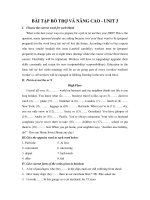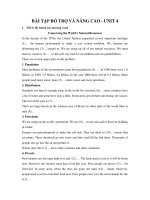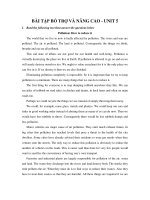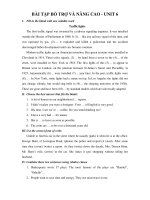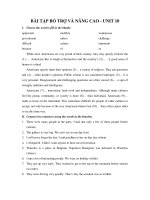BÀI TẬP BỔ TRỢ VÀ NÂNG CAO - UNIT 5 pot
Bạn đang xem bản rút gọn của tài liệu. Xem và tải ngay bản đầy đủ của tài liệu tại đây (68.61 KB, 8 trang )
BÀI TẬP BỔ TRỢ VÀ NÂNG CAO - UNIT 5
I. Read the following text then answer the questions below
Pollution: How to reduce it
The world that we live in now is badly affected by pollution. The rivers and seas are
polluted. The air is polluted. The land is polluted. Consequently the things we drink,
breathe and eat are all polluted.
This sad state of affairs are not good for our health and well-being. Pollution is
virtually destroying the place we live in Earth. If pollution is allowed to go on and on we
will surely destroy ourselves too. We ought to value our planet for it is the only place we
can live in it. If we destroy it then we are also finished.
Eliminating pollution completely is impossible. So it is important that we try to keep
pollution to a minimum. There are many things that we can do to reduce it.
The first thing for everyone is to stop dumping rubbish anywhere they like. We can
see piles of rubbish on road sides, in ditches and drains, in back lanes and often on main
roads too.
Perhaps we could recycle the things we use instead of simply throwing them away.
We could, for example, reuse glass, metals and plastics. We could keep our cars and
sinks in good working order instead of abusing them as many of us can do now. Then we
would have less rubbish to throw. Consequently there would be less rubbish dumps and
less pollution.
Motor vehicles are major cause of air pollution. They emit much exhaust fumes. In
big cities this pollution has reached levels that pose a threat to the health of the city
dwellers. Some cities have already advised their residents to wear gas masks when they
venture onto the streets. The only way to reduce this pollution is obviously to reduce the
number of vehicles on the roads. This is easier said than done for very few people would
want to sacrifice the convenience of having one’s own transport.
Factories and industrial plants are largely responsible for pollution of the air, water
and land. The waste they discharge into the rivers and land destroy both. The smoke they
emit pollutes the air. What they must do is to find ways to reduce their wastes. Also they
have to treat their wastes so that they are harmful. All these things are required if we are
to see any reduction of pollution. At the rate things are going; however, we see increase
in pollution instead.
Whether we can really reduce pollution and thus save our planet is up to us. Pollute it
more and we shall perish.
1. How many ways of reducing pollution in this text?
2. By what way can we reduce pollution?
3. What else can we do to reduce pollution that the author doesn’t mention in this text?
4. Who is responsible for pollution of air, water and land?
5. Give the anonym to each of these words:
a. responsible
e. important
b. reduce
f. possible
c. convenience
g. major
d. minimum
h. harmful
6. Are these statements true or false?
a. The world that we live now isn’t affected by pollution
b. The things we drink, breathe in and eat are all polluted
c. Our planet is the only place that we can live in.
d. It is our duty to save our planet
II. Choose one of these words to fill in the blanks
abruptly
as
because
benefit
discharge
exhaust
garbage
gradually
individuals
or
protects
provide
purify
require
too
Everyone wants to reduce pollution. But pollution problem is (1)… complicated as it
is serious. It is complicated (2)… much pollution is caused by things that benefit people.
For example, (3)… from automobiles causes a large percentage of all air pollution.
But automobiles (4)… transportation for millions of people. Factories (5)… much of the
material that pollutes air and water, but factories give employment to a large number of
people.
Thus, to end (6)… greatly reduce pollution immediately, people would have to stop
using many things that (7)… them. Most people do not want to do that, of course. But
pollution can be (8)… reduced in several ways. Scientists and engineers can work to find
ways to lessen the amount of pollution that such things as automobiles and factories
cause. Government can pass and enforce law that (9)… businesses and (10)… to stop, or
cut down on certain pollution activities.
III. Give a correct form of world in brackets
1. Mr. and Mrs. Brown are a (child) … couple but they are very kind to their neighbor’s-
…
2. I don’t like your (child) … behavior. You are grown up but you are still …
3. When someone is old, he is in his second (child)…
4. To his great loss his wife died in (child)… when he was only 24 years old.
5. The air is naturally (contaminate)… by foreign matter such as plant pollens and dust
6. The heavily (pollute)… atmosphere in some industrial regions is called “smog”, a
word derived from “smoke” and “fog”
7. An ever-growing proportion of this (pollute) … consists of unburned hydrocarbon
gases from the exhausts of automobiles
8. Scientists and engineers have invented filters and other methods of removing
(pollute)… from industrial wastes
IV. Match each number in column A with each letter in column B
1. contaminate A. tool
2. disperse B. amount
3. proportion C. take away
4. garbage D. area
5. release E. help to bring about
6. derive F. purify
7. feature H. obtain
8. contribute to G. make dirty
9. device I. discharge
10. remove J. distinguishing mark or quality
K. kitchen refuse
L. cause to scatter in various directions
V. Form an adjective from its noun
1. to regret 5. atmosphere
2. to prevent 6. environment
3. home 7. logic
4. friend 8. wool
VI. Complete these sentences with a suitable preposition
1. Why are you always jealous … other friends?
2. The form-master was suspicious … my intention
3. He is confident … his success in the final examination
4. I was angry … myself for making such a stupid mistake
5. They were furious … me for not telling them the truth
6. This chemical is harmful … us
7. The monitor is responsible … our form-master for the class
8. We were surprised … the way he behaves. It was quite out of character
9. These days everybody is aware … the danger of smoking.
10. Are you still upset … what I said to you yesterday?
11. We’re short … staff in our office at the moment. There aren’t enough people to do the
work that has to be done.
12. I’m sorry … the smell in this room. It’s just been painted.
13. She’s quite nice but I wouldn’t like to be married … her
14. We are always proud … our country
15. I felt sorry … the children when went … holiday. It rained everyday and they had to
spend most of the time indoors
16. It wasn’t polite … him to leave without saying a word
VII. Supply the best word or words
1. Two things are very alike, so you say they are … each other
A. same with B. same as C. same like
2. You like chocolate. …
A. and me too B. and I too C. and so do I D. and also I
3. … a doctor. I must advice you to give up smoking
A. Like B. Else C. As
4. She said it … she meant it
A. as B. like C. like as if D. as if
5. You play tennis … I do
A. better than B. more good than C. more well
6. … a lot of other people. we managed to survive the recession
A. Contrary to B. In contrast to C. On the contrary with
7. If you … me, just say so
A. disagree with B. differ from C. differ with D. differ by
8. If you don’t like this one, try something…
A. other B. more C. else D. another
VIII. Put a suitable word in each numbered blank:
The smoke that comes from a lit cigarette contains many different poisonous
chemicals. In the part, scientists did not think that these (1)… could harm a nonsmoker’s
health. Recently, though, scientists changed their opinion after they (2)… a large group of
nonsmoker. They discovered that even (3)… had unhealthy amount of these toxic
chemicals in their bodies. As a (4)… of fact, almost all of us, breath tobacco smoke at
times, (5)… we realize it or not. For example, we can’t avoid smoke in restaurants,
hotels, and other public places. Even though many (6)… places have “no smoking is
permitted”. It is even harder for children (7)… secondhand smoke. In the United States,
nine million children under the age of five live in (8)… with at least one smoker.
Research shows that these children are sick more (9)… than children who live in
homes where non-smokers live. The damaging effects of (10)… smoke on children also
continue as they grow up. The children of smokers are more than twice as likely to
(11)… lung cancer when they are adults as children of con-smokers. The risk is even
higher among children who live in homes (12)… both parents smoke.
IX. Rewrite these sentences
1. I don’t suppose you have change for a pound, do you?
Do you happen
2. A train leaves at 7 o’clock every morning
There is
3. An up-to-date visa is necessary for Andorra
You’ll
4. Before he had the car, he went to work by a bike.
Before he had
5. She insisted on a full apology
Nothing but
6. The doctor advised me to rest
The doctor suggested
7. He never had enough money
He’s always
8. Is it possible to travel to London by coach?
I wonder
X. Read the sentences below very carefully. Then match each sentence with the
disaster it describes. Write the numbers in the boxes below.
1. Several people were walking along when suddenly tons of earth came crashing down
the hillside and blocked the road in front of them
2. Over 50,000 people in Ethiopia have died of starvation in the past month. Questions
are being asked concerning the delay in the supplies of rice and grain which were
recently sent to them
3. The winds have already strengthened considerably and the sea is now very rough
indeed. As a result, ferries across the harbor have stopped sailing and all large ships
have put out to sea
4. The river overflowed in several places and huge areas of farming land are now
several feet under water. Boats are being used to rescue people in nearby villages
5. Suddenly the ground shook beneath our feet and tall building opposite the college
began to sway. Windows and doors rattled, and several bookcases in the college
library came crashing down
6. Tankers full of water were sent, but it was too late to save many of the animals and
crops there. The whole area was like a vast desert
7. Smoke poured out of the crater but no one expected an eruption. A week later,
however, red hot lava began to flow down the side of the mountain
8. It swept onwards, covering everything in its path. The travelers had to get off their
camels and lie down until it had eventually passed
9. Flames swept through the block of offices, burning everything inside. Two hours later
only the empty shell of the building remained
10. The first sign of illness was a pain in the chest, followed by a great thirst and a
burning fever. Few medical supplies reached the area and consequently almost all the
victims died.
11. It must have been at least twenty feet high as it swept towards the shore. In a few
seconds it destroyed all the houses in its way, drowning everyone inside.
A. Fire
B. Typhoon
C. Earthquake
D. Tidal wave
E. Plague
F. Volcano
G. Drought
H. Sandstorm
I. Landslide
J. Flood
K. Famine
ANSWER FOR UNIT 5
I. 1. There are four ways of reducing pollution in the text
2. Stopping dump rubbish anywhere by reusing glass, metals and plastics, reducing the
number of vehicles on the road and reducing the wastes from the factories
3. We can grow as many trees as we can
4. It is the man
5. irresponsible – increase – inconvenience – maximum – unimportant – impossible –
minor – harmless
6. F – T – T – T
II. 1. as 2. because/as 3. exhaust 4. provide 5. discharge 6. or 7. benefit 8. gradually 9.
require 10. individuals
III. 1, childless – children 2. childish, childlike 3. childhood 4. childbed 5. contaminated
6. polluted 7. pollution 8. pollutants
IV. 1G 2L 3B 4K 5I 6H 7J 8E 9A 10C
V. 1. regrettable 2. preventive 3. homeless 4. friendly 5. atmospheric 6, environmental 7.
logical 8. woolen
VI. 1. of 2. of 3. of 4. with 5. with 6. to 7. to 8. by/ at 9. of 10. about 11. of 12. about 13.
to 14. of 15. for, on 16. of
VII. 1B 2C 3C 4A 5A 6B 7A 8C
VIII. 1. chemicals 2. studied 3. nonsmokers 4. matter 6. public 7. avoid 8. homes 9. often
10. secondhand 11. develop 12. where
IX. 1. Do you happen to have change for a pound?
2. There is a 7 o’clock train every morning
3. You’ll need to get an up-to-date visa for Andorra
4. Before he had the car, he used to go to work by bike
5. Nothing but a full apology was accepted
6. The doctor suggested I should rest
7. He’s always short of money
8. I wonder whether we can travel to London by coach
X. A9 B3 C5 D11 E10 f7 G6 H8 I1 J4 K2


